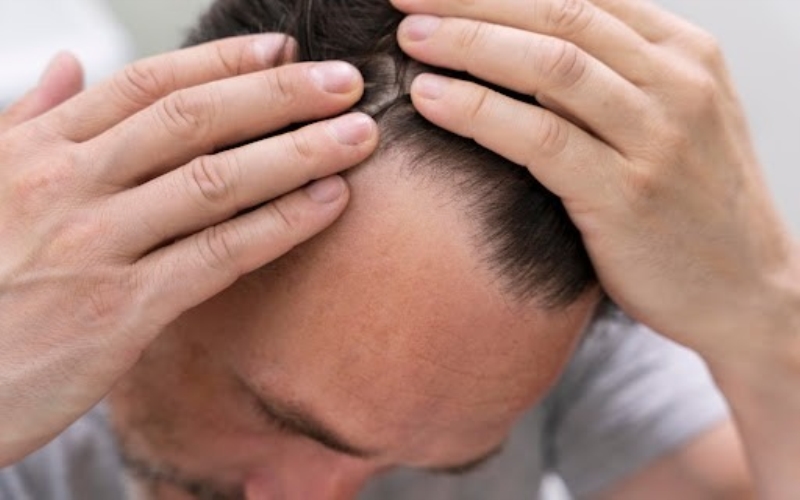Alopecia areata is a common autoimmune disorder that leads to unpredictable hair loss. It is characterized by the body’s immune system mistakenly attacking hair follicles, which results in the hair falling out, often in small, round patches on the scalp or other parts of the body.
Key features of alopecia areata include:
- Patchy Hair Loss: The most noticeable symptom is the sudden appearance of one or more round or oval patches of hair loss on the scalp or other areas with hair.
- Rapid Onset: Hair loss can occur rapidly, sometimes within a very short period.
- No Scarring: Unlike some other forms of hair loss, alopecia areata usually does not cause scarring.
- Regrowth Possible: In many cases, the hair may grow back on its own, but the extent and duration of regrowth can vary from person to person.
- Complete Baldness (Alopecia Totalis) or Loss of All Body Hair (Alopecia Universalis): In rare cases, alopecia areata can progress to complete baldness on the scalp (alopecia totalis) or loss of hair on the entire body (alopecia universalis).
Causes and Risk Factors:
- Autoimmune Response: The exact cause of alopecia areata is not well understood, but it is believed to involve an autoimmune response where the immune system mistakenly attacks hair follicles.
- Genetic Factors: There is evidence of a genetic component, as alopecia areata tends to occur more frequently in individuals with a family history of the condition.
- Environmental Triggers: Environmental factors, such as viral infections or stressful events, may trigger or exacerbate the condition in individuals who are genetically predisposed.
- Other Autoimmune Conditions: Individuals with alopecia areata may have a higher risk of developing other autoimmune conditions, such as thyroid disorders or vitiligo.
Treatment:
There is no cure for alopecia areata, but various treatment options may help manage symptoms and promote hair regrowth:
- Corticosteroids: Topical or injectable corticosteroids can be used to suppress the immune response in affected areas. Visit a Skin Specialist in Karachi for details.
- Topical Minoxidil: This over-the-counter medication is commonly used to promote hair regrowth and may be applied to the affected areas.
- Anthralin Cream or Ointment: This medication can help stimulate hair regrowth by altering the skin’s immune function.
- Immunotherapy: This involves applying substances like diphencyprone or squaric acid dibutyl ester to the affected skin to provoke an allergic reaction and stimulate hair regrowth.
- Oral Medications: In some cases, oral medications such as corticosteroids or immunosuppressants may be prescribed.
- Wigs or Hairpieces: For individuals with extensive hair loss, wigs or hairpieces can provide a cosmetic solution.
It’s important for individuals with alopecia areata to consult with a Dermatologist in Lahore or healthcare professional for an accurate diagnosis and appropriate treatment plan. Additionally, support groups and counseling may be helpful for coping with the emotional impact of hair loss.

